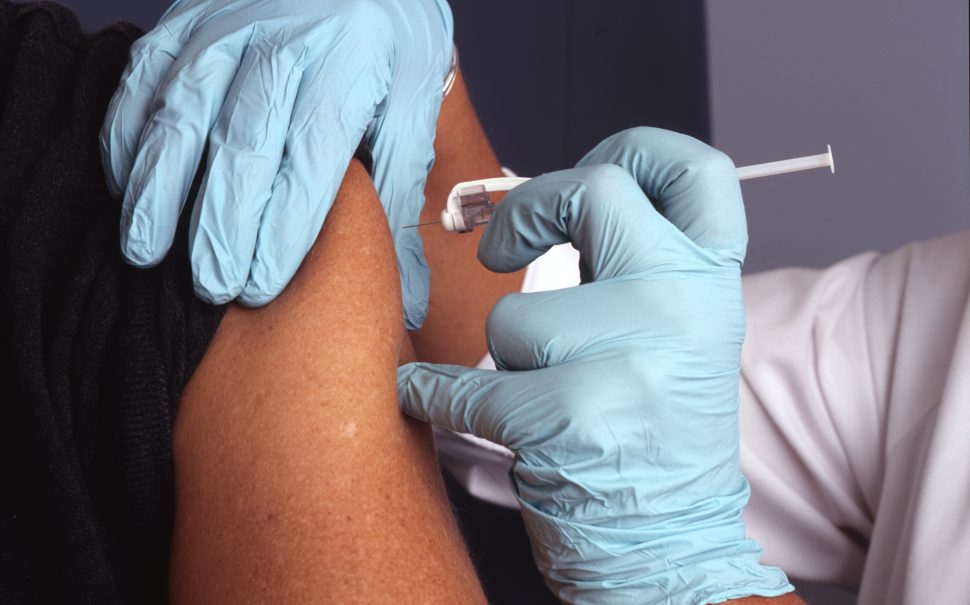Parents have been urged to check their child is up-to-date with vaccines as Greater Manchester falls more than 10% below the child vaccination target against measles, mumps and rubella (MMR).
Data released by the NHS shows only 84.8% of 5-year-olds in Greater Manchester have had both doses of their MMR vaccine – and only 77.3% in the city of Manchester – which falls way below the 95% target needed to achieve and sustain measles elimination set by the World Health Organization (WHO).
As childhood vaccination uptake has fallen by 7.5% in Greater Manchester since December 2017, the NHS has reminded parents and carers to check children are fully up to date with their MMR vaccinations by checking their vaccine records in their personal child health record (Red Book) or contacting their GP.
Dr Helen Wall, Clinical Director for Population Health at NHS Greater Manchester Integrated Care, said: “It is worrying to see a decline in the number of children getting their vaccinations, with even small drops in the number of people coming forward for vaccination, it’s possible for infectious diseases to quickly spread again.
“Indeed, we have had several confirmed cases of measles in Greater Manchester.”
Children in England are offered two doses of the MMR vaccine – the first at one year old and the second at three years and four months. According to the UK Health and Security Agency (UKHSA), two doses of the vaccine are 99% effective against measles.
Of all ten Greater Manchester (GM) boroughs, MMR uptake in the city of Manchester was considerably less than in other boroughs between 2021 and 2022 – nearly 15 percentage points below Stockport, which had the highest uptake across GM yet still fell short of the 95% target for both doses.
Between 2021 and 2022, six GM boroughs met the 95% target for uptake of the first dose in children below the age of five – but not one borough met this target for both doses.
Dr Wall added: “I understand that parents may hesitate to get their child vaccinated because they worry about the safety of the vaccine. I want to reassure those parents that all vaccines are thoroughly tested to make sure they will not harm you or your child.
“Your child may experience mild side effects after having the vaccination such as the area where the needle goes in being sore or the child being a bit unwell for a couple of days. However, this far outweighs the risk of these, sometimes life-threatening, illnesses.”
WInformational Infographic by Bethan FinighanThe UKHSA confirmed there have been 49 measles cases in England from 1 January to 20 April 2023. Despite this rise in cases, the number of children getting vaccinated is declining.
The proportion of children vaccinated with the first dose of MMR by their second birthday was 89.2% in 2021-22, a decrease from 90.3% in 2020-21. Overall, first-dose uptake has fallen by 3.5% in the last 10 years.
In 2019, there were 880 confirmed measles cases in the UK – 49 of which were in GM. Despite this recent outbreak, vaccine uptake has fallen since then.
Dr Vanessa Saliba, a consultant epidemiologist at UKHSA, told the Guardian: “During the Covid-19 pandemic we saw a fall in uptake for the routine childhood vaccinations, including MMR, which leaves us vulnerable to outbreaks, especially as people travel abroad for summer holidays to places where measles is more common.”
Data obtained through FOI confirmed there have been fewer than five lab-confirmed measles in Greater Manchester in 2023 so far. But following the rise in cases, the WHO has warned of an imminent outbreak across Europe.
Dr Jose Hagan, Team Lead for Vaccine-preventable Diseases and Immunization at WHO, said: “All countries, including those verified as having eliminated endemic transmission of measles, must be vigilant for possible importation and spread of this highly contagious disease.”
Featured Image: National Cancer Institute on Unsplash




